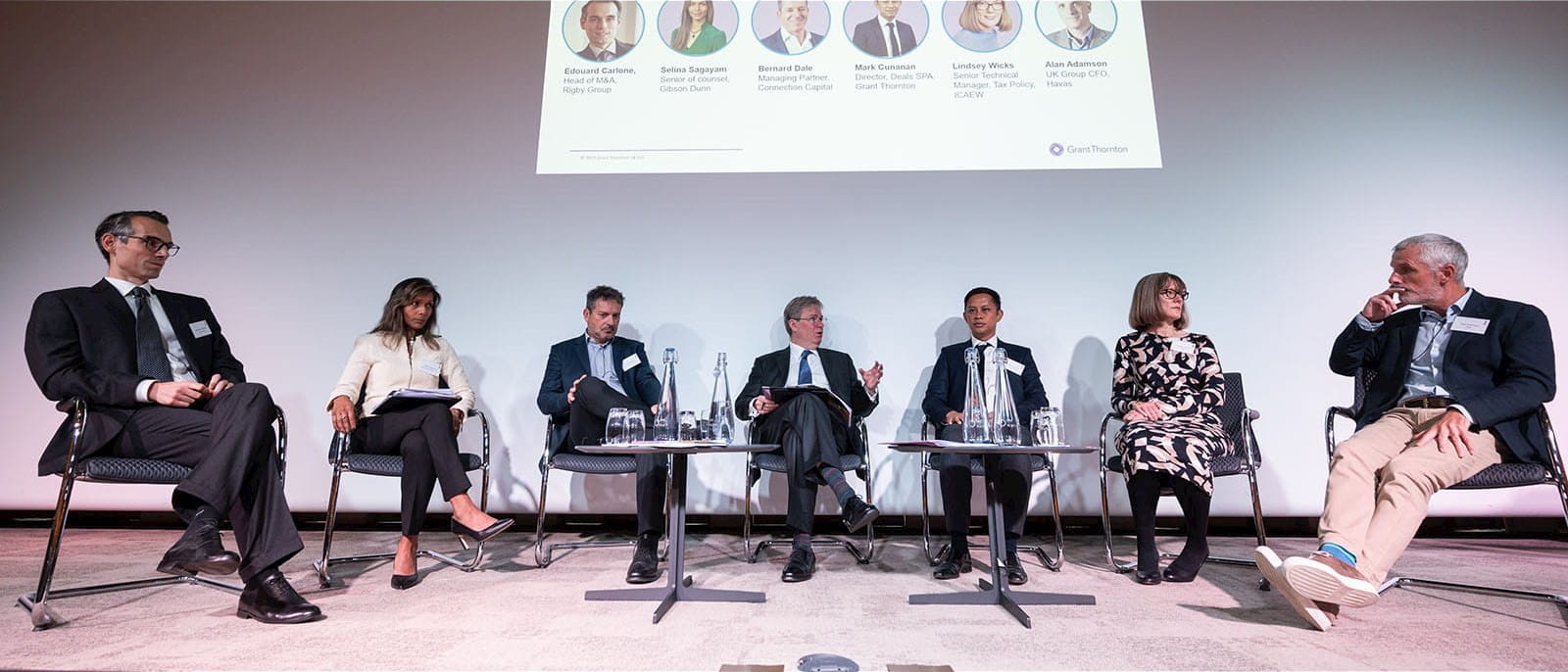New Earn-outs best-practice guideline

Last month, the Corporate Finance Faculty published its Earn-outs in Agreements guideline. A launch event filled the Great Hall at Chartered Accountants’ Hall on 18 October 2023, with almost 250 members in attendance.
The panel, which discussed the highly pertinent issue of earn-outs, included the guideline authors from Grant Thornton: partner Patrick O’Brien, and directors Mark Cunanan and Ed Orme.
Other members of the panel, chaired by ICAEW head of corporate finance David Petrie, were: Alan Adamson, Havas UK group CFO; Edouard Carlone, head of M&A at Rigby Group; Bernard Dale, managing partner at Connection Capital; Selina Sagayam, senior corporate lawyer at Gibson Dunn; and Lindsey Wicks, ICAEW senior technical manager for tax policy.
“Getting deals over the line is rarely straightforward,” said Petrie. “And at certain points in the M&A cycle even beginning a sales process can be a challenging task. A properly conceived and constructed earn-out provides reassurance that a fair price will be achieved, for both buyer and seller.”
Malcolm Bacchus, ICAEW vice-president, introduced the speakers, Patrick O’Brien and Ed Orme, saying: “It is important to get the structure of the deal right so it can progress. This is particularly so in these challenging times for M&A and investment.”
Carlone of the Rigby Group, which makes five or six acquisitions a year, said they typically use earn-outs in deals, as cash flows and the founders are often the value drivers of the deal.
Adamson, who is CFO for Havas, the marketing, media and communications team that has made seven acquisitions over the past three years, said they always use earn-out clauses: “They are people businesses we buy.” He added that during the earn-out period it is important to understand who the value drivers are among the people, and look at how to incentivise them after that period ends: “You should start sooner rather than later and negotiate that early.”
Dale said Connection only use earn-outs in about 10% of their deals, and where used it was to act as a value bridge. The guideline covers earn-out structures and metrics; the challenges of getting to an earn-out acceptable to both counterparties; the tax and accounting treatment of earn-outs; how earn-out payments are calculated; and how disputes may arise and can be resolved.
“Whatever the most basic textbook would have its readers believe, the value of a business is never simply the sum of its future cash flows,” Petrie says in the introduction. “So often, there will be differing views about future prospects. The guideline shows, step by step, how earn-out agreements can be used to secure a good outcome for all parties.”
O’Brien, Cunanan and Orme drafted the best-practice guideline with help from members of the Grant Thornton corporate finance team – Stephen Diver, James Moore, Sue Nyman, Chrissy Wilkinson and others.
The review process included review by ICAEW capital markets policy senior manager Katerina Joannou and peer review by the ICAEW technical committee – in particular its members Tandeep Minhas and Edward Spencer of Taylor Wessing, and Amrit Mahbubani of Panmure Gordon.


Petrie on UK capital markets
David Petrie, ICAEW’s head of Corporate Finance, participated on a panel at The Future of Capital Markets Regulation Summit 2023 last month, where he set out the case that there has been a marked shift in the regulator’s approach to the rules on listing in the City of London.
An alignment between the commercial objectives of those seeking to encourage more companies to list in the City of London, including the professional community of bankers and lawyers, regulators and the London Stock Exchange, has served to push for reforms that should make it more attractive for companies to list in the UK, Petrie said.
“There is certainly a consensus that something needs to be done to support a very desirable policy objective and, following a number of consultations and subsequent reports, a clear set of recommendations has emerged,” Petrie told the audience. “While many in the City do appreciate there may be some negative and presumably unintended consequences of making these changes, there is now a determination for measures that relax certain requirements to pass forward into law or regulation.”
Headline figures show that between 2015 and 2020, London accounted for just 5% of IPOs globally, and the number of listed companies in the UK has fallen by about 40% from a peak in 2008. This prompted the proposal of policy reforms to restore London’s position as a leading financial centre.
The move away from a listing on the LSE does not mean companies are struggling to find funding, Petrie added, just that the routes for investing in British businesses have changed. As the number of public listed companies has reduced, the private equity sector has grown significantly. The size and scale of companies into which private equity houses are able to invest institutional capital or pension fund monies has also increased, he added.
In its representation to the UK Secondary Capital Raising Review, ICAEW expressed some reservations about dual class share structures, which Petrie explained: “It does increase the possibility – albeit remote – that when individuals control public companies, things can go wrong. Superior performance is not necessarily a function of the share structure, but because B class shares are more common in tech companies that have witnessed a valuation boom in recent years.”
Overseas advantage
The practical considerations of listing overseas, and particularly in the US, should not be downplayed, warned Petrie: “Companies that do best in the US also tend to have very significant operating activities in North America. Simply going to the US to try and attract a higher valuation is not something corporate financiers or investment bankers would typically recommend. The fundamental principle remains that companies should list on the exchange where the investor group best understands the operations and the potential of the business.”
The fundamental challenges facing investment in UK public equities go beyond regulations, Petrie warned: “In themselves, changes to the rules and regulations will not necessarily increase the attractiveness of equities. The economic fundamentals are the most important thing for investors, and that is to an extent dependent on the performance of the UK economy and the value of sterling.”
Annual reception speakers announced
The Corporate Finance Faculty Annual Reception is being held on Thursday 9 November at 6.30pm. This year it will feature two guest speakers, with Stephen Welton CBE (1) just added. Welton has taken over from Lord Smith of Kelvin as non-executive chair of the British Business Bank. He co-founded CCMP Capital (formerly JP Morgan Partners) and, before that, was managing director at Barclays Private Equity and Henderson Ventures, (which he also co-founded). He helped found the Business Growth Fund (BGF) in 2011, and was its CEO until 2020, then chair until July this year. He was a member of the Corporate Finance Faculty board between 2014 and 2022.
Previously announced as keynote speaker was Andrew Griffith MP (2), Economic Secretary to the Treasury, who is currently working with the Chancellor of the Exchequer and HM Treasury on the Edinburgh Reforms.
The Annual Reception is free to Corporate Finance Faculty members, who can book their ticket online at events.icaew.com
In brief
Revisions to the FRC’s Ethical Standard
The faculty has contributed members’ comments to the ICAEW submission to the Financial Reporting Council’s consultation on revisions to its Ethical Standard “to further enhance and clarify the principles … auditors must abide by”.
Cyber Security in Corporate Finance: launch event
The launch of the guide will be held at Chartered Accountants’ Hall on 5 December 2023 from 08:30-11:00.
The Corporate Finance Faculty AGM
This will be held on 24 May 2024 at Chartered Accountants’ Hall from 12:30-14:00.
Faculty news
The latest from ICAEW’s centre of professional expertise in corporate finance. Here you can access news from throughout the year.



